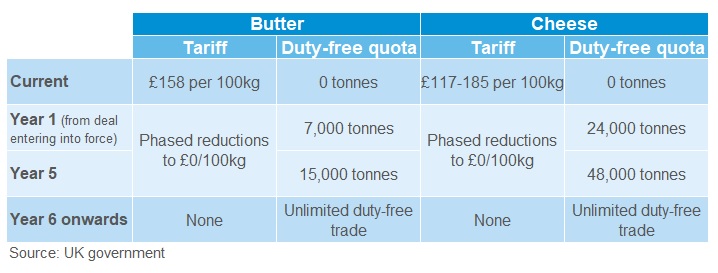How much dairy does New Zealand send to the UK?
Wednesday, 27 October 2021
By Kat Jack
Last week, the UK and New Zealand (NZ) announced the agreement (in principle) of a free trade deal between the two countries. What this will mean for UK agriculture overall has been discussed in our recent blog, but for dairy, a key element of the deal is the proposal to eliminate tariffs on butter and cheese over a five-year period.
Over this time, duty-free import quotas will be made available to NZ. These will gradually increase over five years, with duty free, quota free imports allowed from year 6 onwards.

But, how much of a change is this from the current situation? Let’s take a look at the current trading environment.
Butter
If we look at the last 3 years (2018-2020), New Zealand exported an average of 449,000 tonnes of butter products[1] per year. These were destined primarily for Asian and Oceanic countries, which accounted for 57% of the total. Its biggest single market was China, which accounted for 20% of these butter exports. In contrast, just 0.2% of its exports came to the UK – an average of 835 tonnes. Meanwhile, the UK imported an average of 78,000 tonnes of butter per year in the same period, but due to high third-country import tariffs, almost all of this (99.5%) came from the EU.
Cheese
Over the 2018-2020 period, New Zealand exported an average of 328,000 tonnes of cheese worldwide per year. As with butter, the vast majority (80%) went to Asian and Oceanian countries, with China alone accounting for 20% of total export volumes. In contrast, just 0.03% of exports came to the UK – an average of 89 tonnes per year. On the UK side, we imported an average 504,000 tonnes of cheese per year in the same period – and as with butter, high import tariffs meant 99.6% of this came from the EU.
Barriers to trade
The low trade volumes between the UK and NZ are likely due to two key trade barriers; tariffs and distance.
Currently, the UK has high tariffs on dairy imports, set at £158 per 100kg for butter and ranging from £117-£185 per 100kg for cheese, depending on the product. With these tariffs equivalent to about half the product value[2], they are highly prohibitive to third country imports.
Distance is the other key barrier. With the two countries on opposite sides of the world, transport costs serve to reduce the competitiveness of exports and make closer markets more attractive. Both countries have well established ties with their neighbours – the UK with the EU, and NZ with Asia, which may limit the desire or opportunity to increase bilateral trade.
As part of a wider study, AHDB will be looking in-depth at how this, and other trade deals could impact trade volumes and producer prices. Comprehensive analysis of the Australia trade deal will be published in early November, followed by similar analysis of the New Zealand deal.
[1] Trade code 0405, includes butter, butteroil and dairy spreads
[2] Based on 2021 average UK market prices

Sign up to receive the latest information from AHDB.
While AHDB seeks to ensure that the information contained on this webpage is accurate at the time of publication, no warranty is given in respect of the information and data provided. You are responsible for how you use the information. To the maximum extent permitted by law, AHDB accepts no liability for loss, damage or injury howsoever caused or suffered (including that caused by negligence) directly or indirectly in relation to the information or data provided in this publication.
All intellectual property rights in the information and data on this webpage belong to or are licensed by AHDB. You are authorised to use such information for your internal business purposes only and you must not provide this information to any other third parties, including further publication of the information, or for commercial gain in any way whatsoever without the prior written permission of AHDB for each third party disclosure, publication or commercial arrangement. For more information, please see our Terms of Use and Privacy Notice or contact the Director of Corporate Affairs at info@ahdb.org.uk © Agriculture and Horticulture Development Board. All rights reserved.

